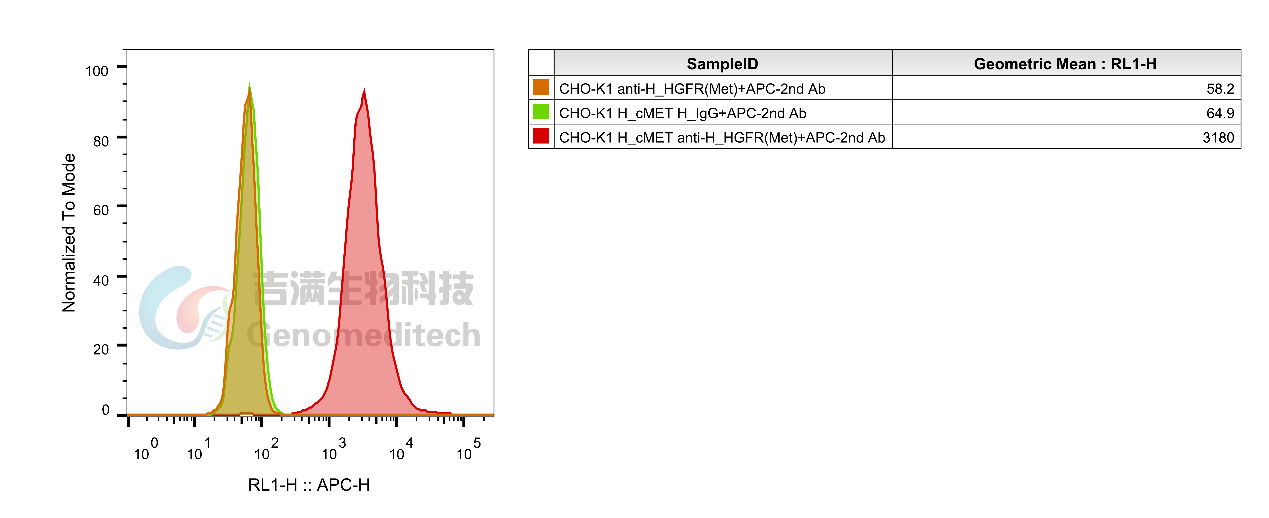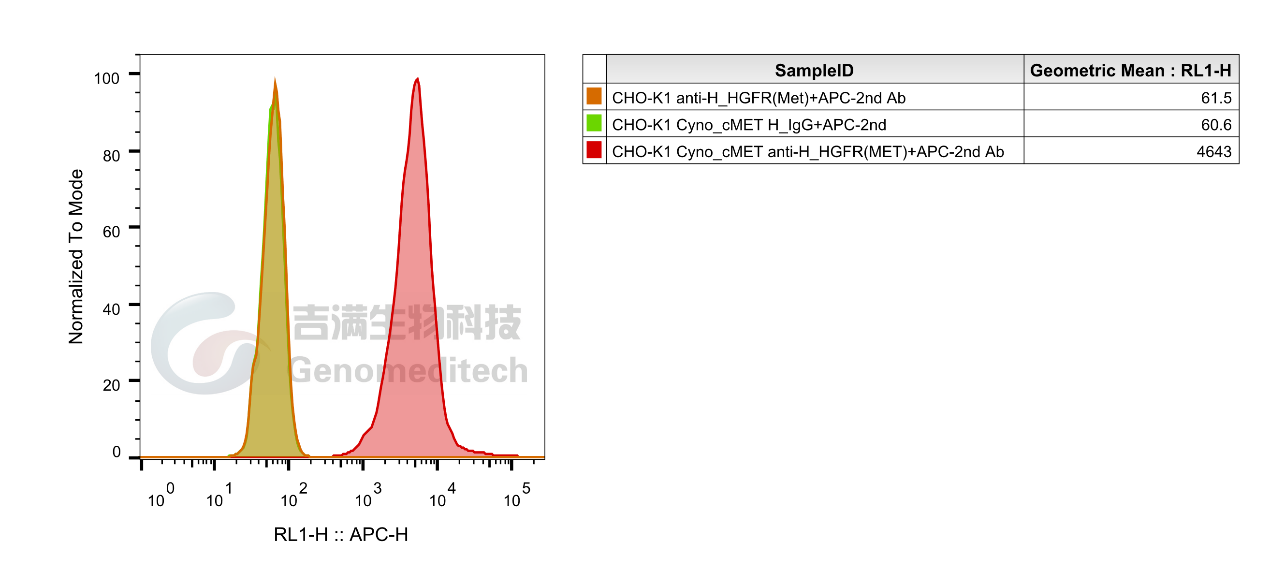Cat.No:GM-28859AB
Product:Anti-H_HGFR(Met) hIgG4 Antibody(Emibetuzumab)
Cat.No:GM-28859AB
Product:Anti-H_HGFR(Met) hIgG4 Antibody(Emibetuzumab)
GM-28859AB-10 10 μg
GM-28859AB-100 100 μg
GM-28859AB-1000 1mg
Species Reactivity Human; Cynomolgus
Clone Emibetuzumab
Source/Isotype Monoclonal human IgG4, κ
Application Flow Cytometry
Specificity Detects MET
Gene HGFR(Met)
Other Names AUTS9; RCCP2; c-Met; DFNB97
Gene ID 4233(human), 102123512(cynomolgus)
Background c-Met, also called tyrosine-protein kinase Met or hepatocyte growth factor receptor (HGFR), is a protein that in humans is encoded by the MET gene. The protein possesses tyrosine kinase activity. The primary single chain precursor protein is post-translationally cleaved to produce the alpha and beta subunits, which are disulfide linked to form the mature receptor. MET is a single pass tyrosine kinase receptor essential for embryonic development, organogenesis and wound healing. Abnormal MET activation in cancer correlates with poor prognosis, where aberrantly active MET triggers tumor growth, formation of new blood vessels (angiogenesis) that supply the tumor with nutrients, and cancer spread to other organs (metastasis). MET is deregulated in many types of human malignancies, including cancers of kidney, liver, stomach, breast, and brain. Normally, only stem cells and progenitor cells express MET, which allows these cells to grow invasively in order to generate new tissues in an embryo or regenerate damaged tissues in an adult. However, cancer stem cells are thought to hijack the ability of normal stem cells to express MET, and thus become the cause of cancer persistence and spread to other sites in the body. Both the overexpression of Met/HGFR, as well as its autocrine activation by co-expression of its hepatocyte growth factor ligand, have been implicated in oncogenesis.
Storage Store at 2-8℃ short term (1-2 weeks).Store at ≤ -20℃ long term. Avoid repeated freeze-thaw.
Formulation Phosphate-buffered solution, pH 7.2.
Endotoxin < 1 EU/mg, determined by LAL gel clotting assay


Cat.No:GM-28859AB
Product:Anti-H_HGFR(Met) hIgG4 Antibody(Emibetuzumab)
GM-28859AB-10 10 μg
GM-28859AB-100 100 μg
GM-28859AB-1000 1mg
Species Reactivity Human; Cynomolgus
Clone Emibetuzumab
Source/Isotype Monoclonal human IgG4, κ
Application Flow Cytometry
Specificity Detects MET
Gene HGFR(Met)
Other Names AUTS9; RCCP2; c-Met; DFNB97
Gene ID 4233(human), 102123512(cynomolgus)
Background c-Met, also called tyrosine-protein kinase Met or hepatocyte growth factor receptor (HGFR), is a protein that in humans is encoded by the MET gene. The protein possesses tyrosine kinase activity. The primary single chain precursor protein is post-translationally cleaved to produce the alpha and beta subunits, which are disulfide linked to form the mature receptor. MET is a single pass tyrosine kinase receptor essential for embryonic development, organogenesis and wound healing. Abnormal MET activation in cancer correlates with poor prognosis, where aberrantly active MET triggers tumor growth, formation of new blood vessels (angiogenesis) that supply the tumor with nutrients, and cancer spread to other organs (metastasis). MET is deregulated in many types of human malignancies, including cancers of kidney, liver, stomach, breast, and brain. Normally, only stem cells and progenitor cells express MET, which allows these cells to grow invasively in order to generate new tissues in an embryo or regenerate damaged tissues in an adult. However, cancer stem cells are thought to hijack the ability of normal stem cells to express MET, and thus become the cause of cancer persistence and spread to other sites in the body. Both the overexpression of Met/HGFR, as well as its autocrine activation by co-expression of its hepatocyte growth factor ligand, have been implicated in oncogenesis.
Storage Store at 2-8℃ short term (1-2 weeks).Store at ≤ -20℃ long term. Avoid repeated freeze-thaw.
Formulation Phosphate-buffered solution, pH 7.2.
Endotoxin < 1 EU/mg, determined by LAL gel clotting assay

